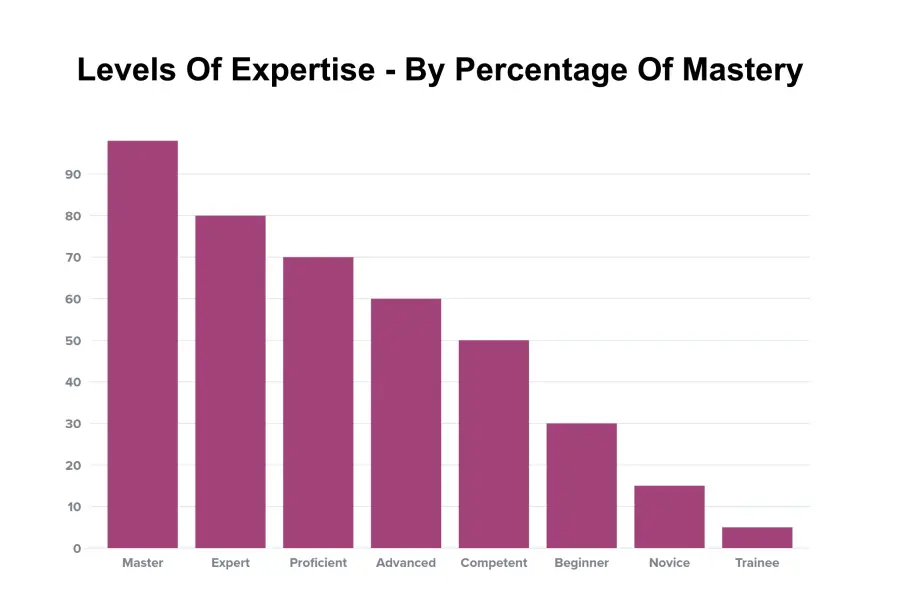The main goal of learning any language is to be able to practically use it on some level. Some have the goal of being fluent while others simply want to be able to understand their favorite foreign films and shows. Proficiency is often spoken of, but is there something just below this? What does less than proficient mean and does it still mean usable?
Being less than proficient in a language means that ease of use and command over most any subject will not always be complete. Some implied meanings or nuanced topics may give an intermediate or even advanced learner problems, whereas a proficient speaker will not have issue.
I am going to look at what less than proficient means in several contexts and the levels and their words that surround it. What we may find is that this designation is less than fixed and more than ambiguous. Let’s dive into being ‘less than proficient’ and see what we can find.

Contents
What’s A Step Below Proficient?
There is a way in which we speak about levels of expertise in subjects like language and mathematics that are more objectively understood. Whereas in other areas like art, these words and levels become more subjective and opinion based. If we are being more precise as with languages, what would a step below proficient be?
According to one of the most widely used language skill leveling systems, the Common European Framework of Reference for Languages (CEFR), the level below proficient is advanced. This labeling is not arbitrary and comes with a set of standards that must be met and evaluated through testing.
The CEFR deals with school aged, adult, and professional business categories/testing in Europe and is respected around the world. Their designation for a step below proficient is labeled as advanced. This is based on their C2 vs C1 designation.
Here is a handy little chart that can help understand the levels of the European Framework…
| Wider Letter Designations | Divided Letter Designations | Level Description |
| A (Basic) | A1 (Beginner) | Can use introductions, simple phrases, and understand slowly spoken basic sentences. |
| A (Basic) | A2 (Elementary) | Can converse about simple tasks and use simple expressions about ordinary or routine actions. |
| B (Independent) | B1 (Intermediate) | Can understand main topics surrounding general themes and points of interest while speaking about personal experiences. |
| B (Independent) | B2 (Upper Intermediate) | Can converse with some fluency and understand more complex texts and conversation. |
| C (Proficiency) | C1 (Advanced) | Can understand and respond to a wide variety of topics even including implied meanings with flexibility and spontaneity. |
| C (Proficiency) | C2 (Proficient) | Can understand with ease most everything heard or read and can express most any response or point fluidly. |
Along with the A1 – C2 levels, they have much wider categories that contain these smaller A, B, and C labels. These three main categories are:
- Proficiency
- Independent (Intermediate)
- Basic
So, in a broader sense you could say that a step below proficient would be intermediate. The word intermediate is not used by the CEFR for good reason, even if the category is commonly referred to by it. They use the word independant instead, referring to the ability to freely use portions of the target language.
Intermediate has some problems when using it to be precise. Let’s look at why advanced used with the more explicit categories is a better choice than intermediate.
What’s Intermediate Level?
Because of the precise nature that many want to have when looking at language ability, the word intermediate sometimes falls short. Why is this and what is an intermediate level?
An intermediate level has the connotation of being between two others instead of holding a fixed position of its own. In language ability it signifies being greater than a beginner, but less than proficient. There are aspects to intermediate levels that are precise, but some tend toward ambiguity.
In the European Framework, the larger category of B is listed as independent whereas the smaller B (B1 and B2) are sometimes given the intermediate moniker. With these smaller levels being more precise by their definition, it is more applicable to note them as intermediate and still have more fixed boundaries.
How Do You Describe Your Proficiency Level?
With a level of proficiency there is an expectation of performance not found in levels of other kinds. A demonstration of knowledge for instance is generally not required in immediate terms. Proficiency in art is very subjective and in stress reduction it is simply not quantifiable. So, in language learning how do you describe your proficiency level?
The most widely and easily used way of describing your proficiency level in a language is to refer to the Common European Framework of Reference for Languages (CEFR). The designations of A1 through C2 are pregnant with meaning that most around the world understand.
There are languages that are not included in this framework and for those other levels and designations will have to be sought. The CEFR covers 38 languages including Arabic, Chinese, and Japanese. Within these languages you can find your proficiency designation either by self evaluation or by formal testing.
For official placement in any of these categories it is necessary to sit for exams given by certified administrating agencies at specified testing sites. Many governmental, corporate, and even small business jobs in European countries and others around the world require these official certifications.
You can describe your proficiency level in loose ambiguous terms, but when needing to describe it in applications and resumes, it is better to go with accepted and accredited level categories. It is advisable if you plan to use the A, B, C system to pass the appropriate exam before stating your level using their framework.
Read more articles here from DoublespeakDojo.com…
- What Is Conventional Language? (Answered)
- What To Call People That Speak 2, 3, 4, 5 Or More Languages
- Can You Speak A Language But Can’t Read It?
What Are The Levels Of Expertise And What Words Are Used?
Deciding how to quantify knowledge and skill is a huge challenge for any organization or individual. Knowing what is meant by the terms chosen is also a challenge since there are no set rule on how to measure these that crosses topical boundaries. So, what would be a general way to express the levels of expertise?

Here are some ideas on how to relate amounts of skill and expertise as related to mastery of a subject…
- Master – This designates someone everyone looks to above all others.
- Expert – A person that can be counted on to know even the small intricacies of a subject.
- Proficient – Someone who easily moves within a topic and is capable in nearly all aspects.
- Advanced – This person has solid knowledge and skill that can be relied upon.
- Competent – This is a designation of good ability and reasonably reliable accuracy.
- Beginner – This is someone who has passed the basics, but still has material to learn.
- Novice – At this stage there may be small amounts of ability, but much is left to gain.
- Trainee – This is the initial stage of learning where little if any ability will be found.
These titles can and are used to mean different thing depending on the context and some are interchangeable for the same level. This is done when less precise categories are needed or for brevity. Yet, when precision is the goal, parsing these words out and giving them nuanced meanings can help.
But are there other words that can be used for these levels? Let’s find out.
Is Proficiently A Word?
Using proficient about your self and others is one thing, but how do we describe an action? We know there are ways to do it, but sometimes they are less used and sound a bit forced. So, is proficiently a word when referring to an act?
Proficiently is a word and more precisely it is an adverb. This word like other adverbs describes an action or a verb instead of a person, place, or thing (a noun). Other words that can be used in place of proficiently are: adeptly, artfully, capably, and skillfully.
So, you can say that someone did something proficiently, even if it is not commonly used enough to sound ‘normal’. It should be used to describe what is being done though, and not used as an adjective to point to a noun.
A good way to keep it all straight is to look at how some a dictionary defines them. Here is one that details proficient used as an adjective.
proficient – adjective
well-advanced or competent in any art, science, or subject; skilled: a proficient swimmer.
Dictionary.com
Now let’s look at what a definition of proficiently used as an adverb is.
proficiently – adverb
in a skillful or expert manner: an administrator who can deal with the problems quickly and proficiently
Merriam-Webster.com
Now that that is cleared up, let’s look at another way some may try to use the word proficient.
What’s A Word For Not Proficient?
If you are not looking for a level or two below the proficient status in language or anything else, but looking from the opposite, there are some words that can help. Let’s look at a few words for not being proficient.
Here is a short list of some of the more popular words used to designate a lack of proficiency:
- incapable – not at all able to complete a task or speak a language in our context here
- incompetent – more likely to fail than to succeed
- unfit – rather than not athletic, it means to not be up to the task or not able to do something
- unqualified – this may mean that they have some skill, but not enough to be trusted in a formal sense
- amateur – non-professional or competent status through lack of adequate training
- novice – this is close to the idea of an amateur and can be used interchangeably at times
- inexperienced – this points to the connection of experience and skill and notes a lack of both
The Final Word On What Less Than Proficient Means…
There are words that describe being less than proficient with some being more precise than others. Intermediate is a good general term, but it lacks strict boundaries of meaning. Advanced is a term often used and is one of the official designations in language learning used around the world.
Whatever word you choose from the details above, it will be the context in which you use it that gives it the most meaning.
More great articles you will like…
